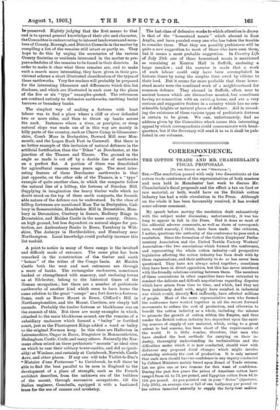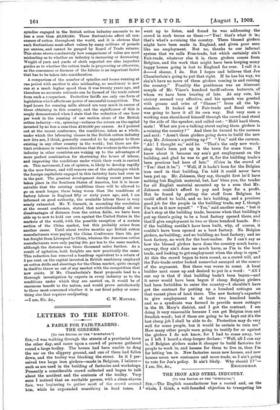CORRESPONDENCE.
THE COTTON TRADE AND MR. CHAMBERLAIN'S FISCAL PROPOSALS.
[To TEE EDITOR 01 TEE "SPECTATOR."] Sin,—The resolution passed with only two dissentients at the cotton trade conference of the representatives of both masters and men held in Manchester last week to discuss Mr; Chamberlain's fiscal proposals and the effect a tax on food or raw material, or both, would have on the British cotton industry has had a wide circulation in the Press. Although on the whole it has been favourably received, it has evoked some adverse comment.
My speech before moving the resolution dealt exhaustively with the subject under discussion; unfortunately, it was too long to appear in full in the Press. Had it done so most of the editorial adverse comments, as well as those of correspond7 ents, would scarcely, I think, have been made. One criticism, I notice, questions the authority of the conference to pass such resolution. Since the formation of the Cotton Employers' Parlia- mentary Association and the United Textile Factory Workers' Association—the two associations which formed the conference, and representing the whole cotton industry—all prospective legislation affecting the cotton industry has been dealt with by these organisations, and their authority to do so has never been questioned. They have not always acted together; sometimes they have been in direct opposition, but this has never interfered with the friendly relations existing between them. The members of these associations in other capacities have been entrusted to conduct the delicate and difficult negotiations regarding disputes which have arisen from time to time, and which, had they net been judiciously dealt with, might have resulted in industrial war which would, directly 4nd indirectly, have affected million's of people. Most of the same representative men who formed the conference have worked together in all the recent forward movements to reduce the cost of production, and otherwise to benefit the cotton industry as a whole, including the scheme to promote the growth of cotton within the Empire, and thus render the British cotton industry less dependent upon the exist- ing sources of supply of raw material, which, owing to a great extent to bad seasons, has been short of the requirements of the world. It is little wonder, therefore, that men who have studied the best methods for carrying on their in- dustry, thoroughly understanding its technicalities and the difficulties under which it is now conducted, should view with disfavour any proposed fiscal changes which might involve enhancing seriously the cost of production. It is only natural that such men should have no confidence in any inquiry conducted by Cabinet Ministers mainly based upon Board of Trade returns. Let me give one or two reasons for this want of confidence. During the past five years the prices of American cotton have ranged from 3d. to 'Id. per pound, and Egyptian cotton from 44. to lid, per pound. As you pointed out in your " Notes " (Spectator, July 25th), an average rise or fall of one halfpenny per pound on the cotton imported annually to supply the forty-four million
spindles engaged in the British cotton industry amounts to no less a sum than £3,500,000. These fluctuations affect all con-
sumers of cotton. throughout the world, and it is obvious that
such fluctuations must affect values by many millions of pounds per annum, and cannot be gauged by Board of Trade returns.
This alone shows conclusively how comparisons of value are most misleading as to whether an industry is increasing or decreasing. Weight of yarn and yards of cloth exported are also imperfect guides as to whether the cotton trade is progressing or otherwise, ae the coarseness or fineness of the fabrics is an important factor that has to be taken into consideration.
A comparison of the number of spindles and looms running at one period with another is also misleading, as machinery is now
run at a much higher speed than it was twenty years ago, and therefore no accurate estimate can be formed of the trade extent from such a comparison. Protective tiffs are only one form of legislation which affects our power of successful competition. The legal hours for running mills abroad are very much in excess of those obtaining in this country, and the significance of this is amply demonstrated when I state that the reduction of one hour per week in the running of one section alone of the British cotton industry—viz., spinning—reduces the return on the capital invested by no less a sum than £140,000 per annum. As I pointed out at the recent conference, the conditions, taken as a whole, under which the labouring classes in the British cotton industry now live are, I think, generally conceded to be superior to those existing in any other country in the world; but there are dis- tinct evidences in various directions that the workers in the cotton industry in other countries are walti,ng up to the advantages of more perfect combination for shortening the hours of labour, and improving the conditions under which their work is carried on. This movement, I am of opinion, is likely to develop rapidly in the near future, and will remove one of the advantages which the foreign capitalists engaged in this industry have had over us in the past. The greatest development during recent years has taken place in the Southern States of America, but it is incon- ceivable that the existing conditions there will be allowed to go on much longer, these being worse than the conditions of factory labour in England fifty or sixty years ago, and, I am informed on good authority, the available labour there is very nearly exhausted. Mr. T. Garnett, in seconding the resolution at the recent conference, stated that notwithstanding all our disadvantages of distance from the cotton fields, we have been able up to now to hold our own against the United States in the markets of the world, with the possible exception of a certain section of the China market, but this probably arises from another cause. Until about twelve months ago British cotton manufacturers were paying the China Conference lines 52s. per ton freight from Liverpool to China, whereas the American cotton manufacturers were only paying 26s. per ton to the same market, although the distance was three thousand miles further. As a result of agitation, both freights are now practically the same. This reduction has removed a handicap equivalent to a return of 3 per cent, on the capital invested-in British machinery employed on cotton drills and sheetings for the China market, quite enough in itself to throw us out of any market with the competition that now exists. If Mr. Chamberlain's fiscal proposals lead to a thorough investigation by experts in every industry as to the conditions under which they are carried on, it would be of enormous benefit to the nation, and would prove satisfactorily to those most concerned whether it is our fiscal policy or some- thing else that requires readjusting.
—I am, Sir, &c., C. W. MACARA.







































 Previous page
Previous page